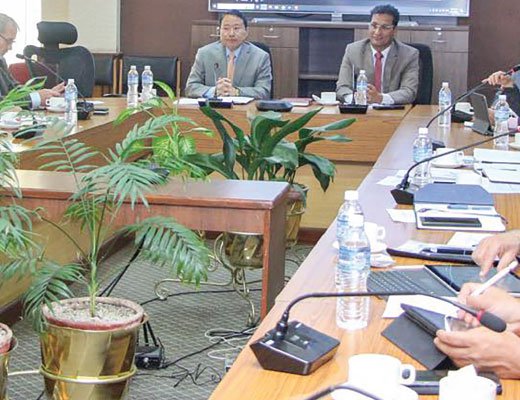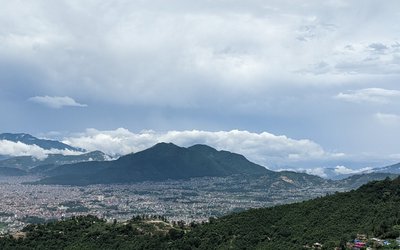
The government and the main financial managers of Upper Arun and Dudhkoshi hydel projects - World Bank and the Asian Development Bank - have agreed to start the project construction work quickly.
In a meeting held at the Ministry of Finance on Thursday among Minister of Finance Barsaman Pun, Minister of Energy Water Resources and Irrigation Shakti Bahadur Basnet, Revenue Secretary of the Ministry of Finance Dr. Ram Prasad Ghimire, Energy Secretary Sushil Chandra Tiwari, Managing Director of Nepal Electricity Authority Kul Man Ghising, World Bank's Country Director for Nepal, Maldives and Sri Lanka of World Bank Faris Hadad-Zervos (virtually) and ADB's Director of Asian Development Bank Arnaud Cauchois have agreed to speed up the construction work by completing the financial management of both the projects.
There was a detailed discussion about project financing management and capacity building for project implementation, according to a press statement of the Ministry of Finance. In the discussion, a presentation was made about the work completed for the preparation of both the projects.
The construction process of the 1,063 MW Upper Arun Hydropower Project to be built in Bhot-khola Rural Municipality of Sankhuwasabha as a ‘game changer’ project has advanced.
It has been decided to construct the project through a subsidiary company of the Nepal Electricity Authority with the mixed investment of the World Bank’s concessional loan and domestic banks and financial institutions.
Similarly, there is a plan to build a reservoir on the Dudhkoshi River and generate 635 megawatts of hydropower at Lamidanda of Rawabesi Rural Municipality-3 in Khotang and Rabuwaghat of Chishankhugadhi Rural Municipality-6 in Okhaldhunga. Under the leadership of the Asian Development Bank, the project is going to be constructed with the investment of the World Bank, Citizen Investment Trust and the general public.
There is a plan to raise 70 per cent loan investment from the organisation and 30 per cent from equity.
Upper Arun Hydro-Electric Limited, a subsidiary of Nepal Electricity Authority, promoter of the project, has said that the construction of the project will start from the beginning of 2026.
An estimated time limit of five years has been fixed for the construction of the project. The construction of 2-km tunnel and 21-km access road has progressed in preparation for Upper Arun Hydropower Project. Land acquisition and distribution of compensation is almost over.
Upper Arun is a game changer project of Nepal which will be operated at full capacity for six hours a day during the six months of winter when there is a high demand for electricity. Around 4.53 billion units of electricity will be produced annually from this project.
The feasibility study, detailed engineering design, environmental impact study and evaluation of Dudhkoshi Hydropower Project have already been completed. The work of construction of access road and distribution of compensation is in the final stage.
Speaking at the meeting, Finance Minister Pun said that after the construction of big projects like Upper Arun and Dudhkoshi Hydropower Project, a new chapter will be added in Nepal's energy sector.
Stating that the government is clear that there should be no delay in the construction of both the projects, he said that he is ready to facilitate it.
He said that preparations for both projects are going well and he is happy to know that the major finance managers World Bank and Asian Development Bank are coordinating with the co-financiers.
Minister Pun expressed his belief that after the construction of the two big projects, Nepal's capacity to build other big projects will improve.
He said that more investment is needed for clean energy production in the future as there is a possibility of more demand in the regional market.
Minister Pun appealed to development partners, including the World Bank and Asian Development Bank, to increase investment as the investment environment in Nepal's energy sector is good.
On the occasion, Energy Minister Basnet urged the development partners to invest in Nepal's hydropower sector.
Source: The Rising Nepal
- Weather Forecast: Generally Cloudy Across The Country With Heavy Rain At One Or Two Places In Koshi, Bagmati And Lumbini Provinces
- Jul 04, 2025
- Global IME Capital’s “Samunnat Yojana 2” Mutual Fund Opens for Public Offering from July 6
- Jul 03, 2025
- Nepal Among Investment-Friendly Countries, Immense Opportunities Exist – Prime Minister
- Jul 03, 2025
- Supreme Court upholds appointment of 52 officials
- Jul 03, 2025
- Weather Forecast: Generally Cloudy In The Hilly Areas With Heavy Rainfall In Some Areas Of Bagmati And Koshi Province
- Jul 03, 2025















